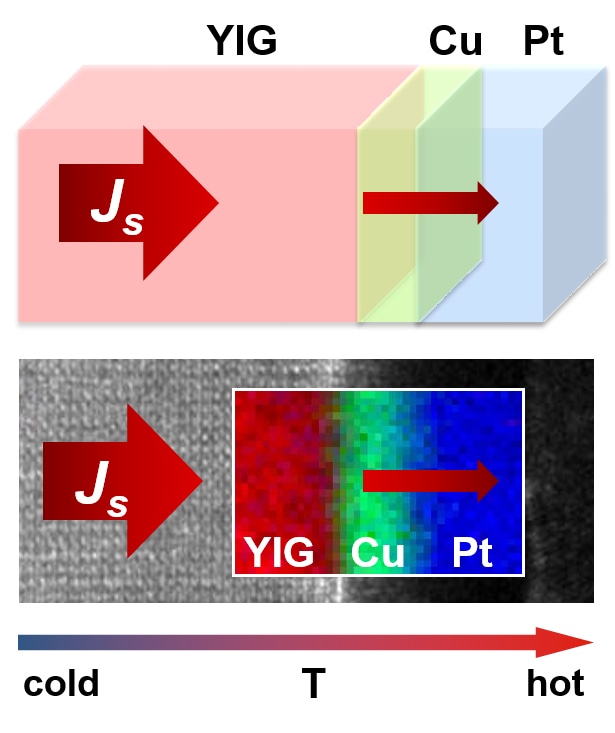Jul 29 2016
To conceptualize and develop new processes for information processing, a fundamental building block is thermoelectric effects as they allow waste heat released by different processes to be reused to run the respective devices. These effects play a role in the establishment of processes that are more energy efficient and environmentally friendly.
 Thermally excited spin waves carry a spin current from the ferromagnet (YIG in this case) into the metal layer. Depending on the YIG thickness and the interface condition the amplitude of the spin current as well as transmission properties change. (credit: ill/©: Joel Cramer, JGU)
Thermally excited spin waves carry a spin current from the ferromagnet (YIG in this case) into the metal layer. Depending on the YIG thickness and the interface condition the amplitude of the spin current as well as transmission properties change. (credit: ill/©: Joel Cramer, JGU)
Spin Seebeck effect is a potential representative of this effect category and is increasingly gaining significance in recent times. Using this effect, waste heat can be converted into spin currents and energy and data can be transported in magnetic, electrically insulating materials. However, this effect is yet to be fully understood.
In a study reported in the Physical Review X journal, physicists from Johannes Gutenberg University Mainz (JGU) in Germany and their associates from Glasgow University in Scotland have successfully revealed the fundamental properties of spin Seebeck effect. The study results help gain new insights into the underlying processes of this phenomenon, thereby supporting further development of this effect for its first applications.
The spin Seebeck effect comes under the category of spin-thermoelectric effects. Earlier studies carried out by the physicists at Mainz University in partnership with researchers from the University of Konstanz and the Massachusetts Institute of Technology (MIT) have revealed that the establishment of a thermal non-equilibrium causes the formation of magnetic waves or magnons in the magnetic materials. As these waves are capable of transporting both energy and torque, a voltage signal can be induced in the adjacent metal thin films.
Significant contribution in the new field of magnon spintronics
The researchers established a direct correlation between the intrinsic properties of magnons and the amplitude of the voltage signal by performing material-dependent measurements with a varied thickness of the magnetic material of interest over a wide temperature range. They also demonstrated that the atomic structure of the interface between the magnetic material and the adjacent metal thin film also has a strong influence on the temperature dependence of the voltage generation efficiency.
Step by step answers to the open questions about the fundamental processes of the spin Seebeck effect are given. Our results yield an essential contribution for the development of the aspiring field of magnon spintronics.
Joel Cramer, PhD Student, Graduate School of Excellence Materials Science in Mainz (MAINZ)
Professor Mathias Kläui added: "I am very glad that by means of the intensive collaboration with our colleagues we were able to correlate the transport of spins with the microscopic, atomistic structure. The cooperation with our colleagues from Glasgow already led to several mutual publications and an active exchange with leading groups from abroad is one of the central measures of our Graduate School of Excellence."
The MAINZ Graduate School was established in 2007 following the approval through the Excellence Initiative by the German Federal and State Governments to Promote Science and Research at German Universities. The school received extended funding in the second round in 2012. It comprises of research groups from Johannes Gutenberg University Mainz, TU Kaiserslautern, and the Max Planck Institute for Polymer Research in Mainz. One of the key research areas of the school is spintronics, where the school receives a significant contribution from its international partners.